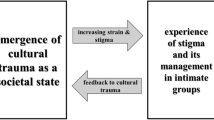Abstract
This discussion is a response to a paper concerning the oppression of the Christian religious minority community in present-day India. I explore several themes presented by Masih through a psychoanalytic consideration of individual experience, marginalization, theories of prejudice, individual and social trauma, post-colonial critiques, and intersectionality. Links are made between the trauma of colonialism and the present day persecution of Christians in India.
Similar content being viewed by others
References
Akhtar, S. (2005) Hindu-muslim relations in India: Past, present, and future. In: S. Akhtar (ed.) Freud Along the Ganges: Psychoanalytic Reflections on the People and Culture of India. New York: Other Press, pp. 91–137.
Akhtar, S. and Choksi, K. (2005) Bollywood and the Indian unconscious. In: S. Akhtar (ed.) Freud Along the Ganges: Psychoanalytic Reflections on the People and Culture of India. New York: Other Press, pp. 139–173.
Altman, N. (2008) On suicide bombing. International Journal of Applied Psychoanalytic Studies 5(1): 51–66.
Chatterji, A.P. (2010) Violent Gods: Hindu Nationalism in India’s Present; Narrative from Orissa. New Delhi: Three Essays Collective.
Gump, J.P. (2000) A white therapist, an African American patient—shame in the therapeutic dyad. Psychoanalytic Dialogues 10(4): 619–632.
Human Rights Watch. (2018) World report 2018: Status of human rights around the world. https://www.hrw.org/sites/default/files/world_report_download/201801world_report_web.pdf, accessed 23 December 2019.
Ilaiah, K. (2002) Why I Am Not a Hindu: A Sudra Critique of Hindutva Philosophy, Culture, and Political Economy. Calcutta: Samya.
Jha, D.N. (2009) The Myth of the Holy Cow. New Delhi: Navanya.
Sen, A. (2005) The Argumentative Indian. New York: Picador.
Stein, R. (2006) Fundamentalism, father and son, and vertical desire. Psychoanalytic Review 93(2): 201–229.
Winnicott, D.W. (1960) Ego distortion in terms of true and false self. In: Maturational Processes and the Facilitating Environment. Connecticut: International Universities Press, pp. 140–152.
Young-Bruehl, E. (1996) The Anatomy of Prejudices. Cambridge, MA: Harvard University Press.
Author information
Authors and Affiliations
Corresponding author
Additional information
Publisher's Note
Springer Nature remains neutral with regard to jurisdictional claims in published maps and institutional affiliations.
Rights and permissions
About this article
Cite this article
Rao, J.M. Reverberating Disquietude: A response to Shalini Masih’s “A Sustained Note of Disquiet”. Psychoanal Cult Soc 25, 263–270 (2020). https://doi.org/10.1057/s41282-020-00171-8
Published:
Issue Date:
DOI: https://doi.org/10.1057/s41282-020-00171-8



